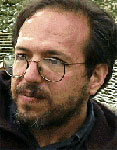 demands two things that are yet worse than an infinite statistical ensemble (which I went into in Part 1 of this series): Firstly, Darwinian argumentation as a fundamental explanation, and secondly, that the fundamental theory can potentially be falsified.
demands two things that are yet worse than an infinite statistical ensemble (which I went into in Part 1 of this series): Firstly, Darwinian argumentation as a fundamental explanation, and secondly, that the fundamental theory can potentially be falsified.
Lets first deal with Darwinian selection as the fundament: If you have a dead planet as a given, it is valid to ask where the amazingly complex animals came from, but it is even more important to understand where the first cells came from. Pre-biotic evolution resulted in those first beginnings on the otherwise dead background (e.g. earth). However, Smolin completely disregards the question of where the first black holes are coming from and what the dead background is on which the Darwinian selection process makes sense at that point. He only looks at efficient propagation, but has no environment in which different offspring could compete for resources, for example. They “compete” for sheer number, but that is not a scarce resource if you have infinity to take from.
One cannot get the ultimate fundament from Darwinian evolution, because such evolution always requires a background on which selection happens. His solution is at most a little step in what may easily become an infinite regress, a tower of Darwinian evolutions, a tower of dead backgrounds, with the black holes being only one tiny step. To Smolin’s credit, he is not so much interested in already having a final theory than he is interested in proper science.
On to the second aspect: Smolin draws on Karl Popper, who is famous for demanding that good theories must offer ways to decide, best by experimental observation, whether they are “right or wrong”. This is of course expressed with more sophistication via hypotheses and so on. Nevertheless, I rather speak about using observation in order to stake out a theory’s domain of applicability (Einstein did not prove Newton wrong!). This view also helps to understand that if the domain is unbounded, as is obviously the case for a truly ultimate theory, it cannot be falsified. Smolin started the whole Smolin/Susskind debate because he feels that “the anthropic principle cannot yield any falsifiable predictions, and therefore cannot be a part of science”. String theory is not a good theory in this respect, because it is mathematically so rich that one finds always some way to change the theory to account for pretty much whatever you could possibly observe. That is bad in a way, but it is actually exactly what the final theory should do!
The ultimate theory cannot be supposed to be also coming with stuff that you can potentially falsify. The theory of everything tells us all that is possible. Any partial (i.e. not ultimate) theory may be expected to come with stuff that can be either this or that way, A or B. One, maybe A, fits to the rest of the world, the other one, say B, is wrong, it does not fit the rest. B can be found to be wrong by experimental observation, but the fundamental reason for its being wrong is that it is inconsistent with the rest of the whole. Now back to the ultimate theory of everything: your subject is totality, theories that tell us all that is possibly possible. In that case, the overall consistency is already there in the concept. You should not expect this theory to hand you anything falsifiable. Again, to Smolin’s credit, he is not claiming to be interested in the ultimate physics, but only in the next step, in falsifiable hypotheses concerning quantum gravity.
Next time, I will start with ripping on Susskind.



Comments